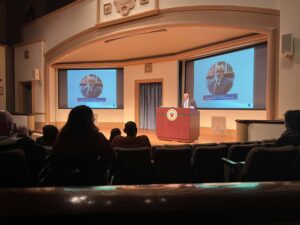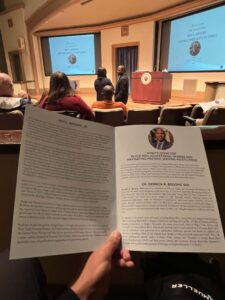The University of San Diego hosted the inaugural Roy L. Brooks distinguished lecture series for the first time ever. Honoring a scholar whose work has profoundly impacted the field and emphasized the importance of community involvement in promoting educational equity and racial justice. The USD community wanted to show their appreciation for Professor Roy L. Brooks for his innovative research, excellent teaching, and unyielding commitment to improving the world. Hence, they created a lecture series in his honour. Professor Brooks has made significant contributions to law and society, which several publications and books have recognized. He delivered the inaugural lecture at the American Society as a professor at USD.
Well-known sociologist and researcher Dr Derrick R. Brooms talked about the educational goals and experiences of Black males who work in Hispanic social organizations. Dr Brooms argued that the Black community must have community support and investment to achieve educational equity and racial justice. In addition, he stressed the significance of people’s efforts in making a difference and encouraged his listeners to shoot for the stars in their quest to impact the world positively.
Dr Brooms was moved to give this talk after reading a poem Professor Brooks’ late wife had written about him in which she praised his dedication to bettering the world. Dr Brooms used the poem to stress the value of having a lasting, positive effect and making progress. He also emphasized the need to counter stereotypes about Black males and their pursuit of higher education.
Significantly, Dr Brooms’ talk highlighted the necessity for community support and investment in the Black community to achieve educational equality and racial justice, shedding attention on Black males’ difficulties in accessing higher education institutions. His talk was important because it encouraged his listeners to think big and make a difference in the world via their efforts.
The problems Black males experience in higher education institutions, the significance of community support and investment in the Black community, and the need for individual acts were the central storylines and topics of the presentation (Nobles, 1976). Dr Brooms used a statement by James Baldwin, “You were not expected to aspire to excellence, you were expected to make peace,” to highlight the bias against Black men’s academic aspirations (Baldwin, 1965). He suggested that these stereotypes do more damage than good by lowering Black men’s expectations for themselves and maintaining racial inequity in educational opportunities.
Dr Brooms’s research objective is to understand better what Black males need to succeed in college. He contends that helping the Black community financially and morally is essential to achieving educational equality and racial justice. He stresses the need for genuine connections and cares for pupils to create an atmosphere encouraging achievement and belonging.
The importance of Dr Brooms’ lecture to our understanding of African American history stems from his emphasis on the difficulties Black men face when attempting to enroll in and succeed at universities, as well as the necessity of community support and investment in the Black community to advance educational equity and racial justice (Brooms, 2021). His talk encouraged his listeners to think big and make a difference in the world, stressing the significance of personal initiative.
Dr Brooms’ talk and the readings from Freedom on My Mind and “Racism and White Denial in the American Criminal Justice System” by Cheryl Harris are harmonious in their ideas and storylines. Both novels highlight how preconceived notions about African Americans stifle their potential and contribute to the upkeep of injustice in various settings. They also stress the significance of financial and social investments in advancing social justice and equality.
The part of Dr Brooms’ presentation when he read the poem his late colleague Professor Brooks’ wife had written about him stuck out the most. Professor Brooks’ wife wrote a beautiful poem about how much she adored him because he worked to make the world a better place for everyone. This event encapsulated the spirit of the first Roy L. Brooks Distinguished Lecture Series by highlighting the power of one person to change the world.
Professor Brooks’ enormous publishing record—more than 100 papers and 20 books—attests to his dedication to academic rigor and originality. As a result of his prominence as an expert in his profession, he was the first professor at USD to be asked to lecture at the American Society. Professor Brooks’s unique selling point is his capacity to engage and motivate his pupils. His pupils like him because of his boundless enthusiasm for teaching and his knack for simplifying seemingly intractable concepts.
The presentation by Dr Brooms focused on the idea of global excellence and transformative influence. He spoke on the significance of equal education and racial equality for black males and their societal place. He stressed the importance of true connections and cared for pupils in creating an atmosphere where black males may flourish.
Dr Brooms plans to study black male college students to learn more about their perspectives and identify strategies to help them succeed in school. He discussed the outcomes of his research on the needs and expectations of black males when they engage with organizations that primarily serve the Hispanic community. He talks about the value of engaging in and dedicating oneself to the black community and studying with them rather than just conducting research on them.
During his talk, Dr Brooms was often asked, “How do we get from problems to possibilities?” He claimed that we need to think that our actions may make a difference and that it is necessary to confront and disprove unfavorable views. He also tells us about the need for a setting that encourages and facilitates students’ intellectual and personal growth.
The lecture’s key storylines and themes were important for our comprehension of African American history because they shed light on the never-ending fight for racial justice and educational fairness. They also stress the significance of people’s efforts and determination to effect change. Professor Brooks inspires us all because of his commitment to scholarly and educational quality and his transformative influence on the globe via his work as an educator, researcher, and mentor (Gurin et al., 2002).
Using material like Freedom on My Mind from an African American history class might help put what you’re teaching in perspective and help students connect the lecture and their studies. The Black Power movement and the turn to a more radical, militant approach to attaining racial justice are discussed in Chapter 10, one of the most relevant chapters. Similar to Dr Brooms’ lecture, this section emphasizes the power of the person to effect change via grassroots engagement.
It is essential to use academic, secondary sources to back up our analysis, in addition to primary literature used in the course. Robert T. Palmer and J. Luke Wood’s “Navigating the Ivory Tower: The Experiences of Black Men in Graduate and Professional Education” is one such piece. This essay delves into the realities of higher education for black males, examining their obstacles and how they overcome them. This article’s ideas and tales are pertinent to Dr Brooms’ presentation and may enrich our knowledge of the difficulties he raised.
In conclusion, Roy L. Brooks Distinguished Lecture Series was enlightening because it brought light on the obstacles. Black males face higher education and the need to provide spaces that encourage and facilitate their success in the classroom. Dr Brooms’s talk focused on shifting focus from issues to opportunities and developing nurturing classroom communities that put students first. His findings highlight the need to provide Black male college students with tools and assistance to help them succeed in their studies. Dr Brooks’s talk praised the achievements of a legendary educator and researcher while also stressing the need to set lofty goals for one’s professional and educational future (Wenger, 1998). The lectures were thought-provoking and educational overall, shedding light on vital topics relevant to the world of higher learning and society at large.
References
Baldwin, J. (1965). The American Dream and the American Negro. New York: New York Times.
Brooms, D. R. (2021, February 25). What’s Going On? Black Men’s Educational Desires and Navigating Hispanic Serving Institutions [Lecture]. Inaugural Roy L. Brooks Distinguished Lecture Series, University of San Diego, San Diego, CA.
Gurin, P., Dey, E. L., Hurtado, S., & Gurin, G. (2002). Diversity and higher education: Theory and impact on educational outcomes. Harvard Educational Review, 72(3), 330-366.
Nobles, W. W. (1976). African Philosophy: Foundations for Black Psychology. Journal of Social Issues, 32(3), 119-127.
Wenger, E. (1998). Communities of practice: Learning, meaning, and identity. Cambridge University Pr


